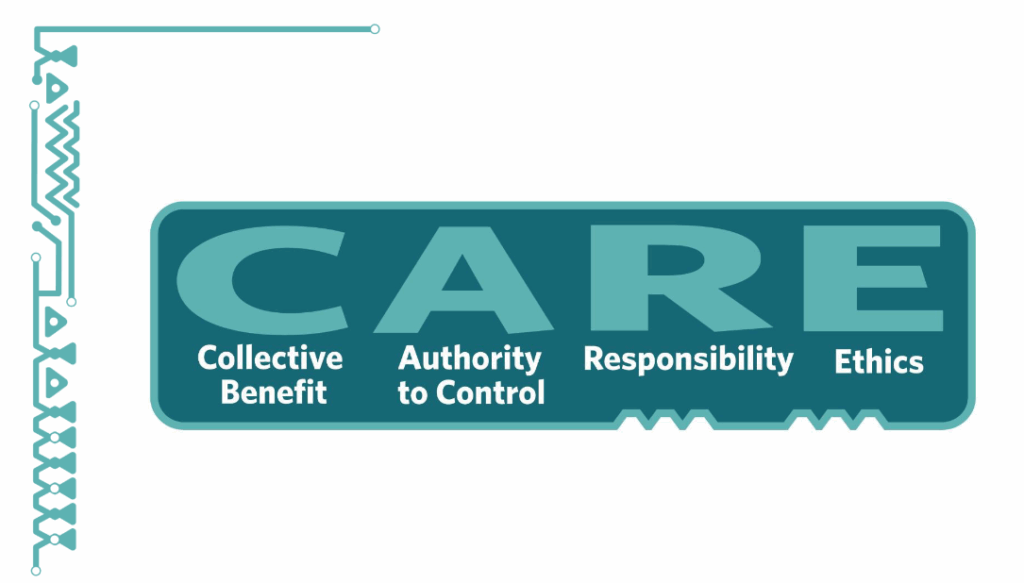This blog post is part of a series.
Part 1 can be found here: https://winoda.de/en/2025/08/13/the-magic-of-acronyms-part-1-fair/
Another acronym that is often mentioned in the same breath as FAIR data is CARE. This acronym also has a homonymous counterpart (to care), which we would like to take a closer look at. But what is it all about?
While the FAIR principles primarily address technical issues of data management, whose professional ethical aspects are only subtly echoed in the sporting term “fair,” the CARE principles focus on ethical and legal considerations.

The CARE Principles for Indigenous Data Governance were developed in 2019 by the Global Indigenous Data Alliance (GIDA) and focus specifically on the handling of data relating to indigenous communities. They address issues of control, responsibility, and justice. The aim is to protect the interests and rights of indigenous peoples and strengthen their self-determination over the use of their data. Data are intended to serve the collective good of the indigenous community.
Whereas the FAIR principles claim universal validity, the CARE principles only apply to a subset of data. (For even if ethical action in the sense of CARE would always be right and appropriate regardless of the field of research and would benefit everyone, this discourse should not yet be shifted and generalized beyond indigenous (or other marginalized) groups—the reclamation of the political rights of indigenous peoples has not yet progressed that far…)
This is because the CARE principles stem from the postcolonial emancipation of specific ethnic, social, cultural, and, underrepresented – not least, within the scientific community – population groups (“indigenous peoples”).
They are essentially a response to colonial practices of knowledge acquisition and data use and raise awareness of the blind spot in the Western-dominated scientific system: the persistence of structural data colonialism.
After all, since colonial times, vast amounts of knowledge, cultural assets, and data about indigenous peoples have been collected, archived, and used with the help of colonial power structures without their consent, e.g.
- Anthropological/ethnographic studies
- Health data
- Land use and environmental information
- Language recordings and cultural practices
The colonial powers were the only ones to benefit. Knowledge about indigenous groups was (is?) extracted, controlled, and often used against them.
In response, the CARE principles call for
- Data use for the collective benefit of the indigenous community
- Authority to control indigenous communities’ own data
- Data use and research with responsibility toward indigenous rights and interests
- A central role for indigenous ethics, standards, and worldviews in data practices as postcolonial recognition of alternative knowledge systems.
As with FAIR, complex aspects of scientific activity have been condensed into an acronym. The rhyme between “CARE” and “FAIR” further contributes to the perception of the principles as complementary and interrelated. It rhymes, and what rhymes is good!
But does the choice of the homonym “care” support the understanding of CARE principles or even their acceptance in the same way as FAIR and “fair” do?
I believe that this case is not quite so clear-cut.
The English word “to care” can mean either to nurse someone, to look after someone, or to have an emotional interest in something or someone. Semantically, it evokes nurturing, responsibility, caution, and diligence.
However, caring relationships are not necessarily neutral: especially in social or postcolonial contexts, care can reflect asymmetrical power relations—those who care have decision-making authority. Those who are cared for are often not involved on an equal footing.
The CARE principles for indigenous data governance, on the other hand, attempt to distance themselves from such asymmetrical notions of “care”: it is not “outsiders” who take care of indigenous data, but indigenous communities themselves who determine and control what ethical care means – on the basis of collective rights. The acronym CARE emphasizes their sovereign self-responsibility. Paternalistic care must therefore first be recoded to respect, equality, and self-determination. Does this work?
I would say yes and no. On the one hand, this reinterpretation requires so much mental effort that I had to write my longest blog article to date just to properly think through what was bothering me.
On the other hand, it obviously worked. The CARE principles are established, attract attention, and bring the debate about implicit power relations in the handling of data into the general consciousness.
The blind spot disappears.
(Incidentally, WiNoDa is planning a whole series of webinars for 2026 on the topic of the professional handling of data from sensitive contexts, in which CARE will also play a role. We will provide information in good time!) A webinar was already held on May 20, 2025: “Be FAIR and CARE: Core Principles for Open Science in Research with Objects“. (Recording: https://www.youtube.com/watch?v=02cCwscKzC0; Presentation: https://doi.org/10.5281/zenodo.15607066)
The CARE principles for indigenous data governance were published in 2019 here: https://datascience.codata.org/articles/10.5334/dsj-2020-043. See also: https://www.gida-global.org/care

As an academic staff at the DAI, my main responsibility for WiNoDa lies in the creation of self-study courses on discipline-specific data literacy.
Hands-on and interactive – my goal is: less technical jargon, more “aha” moments.
Because we are all working with data!
